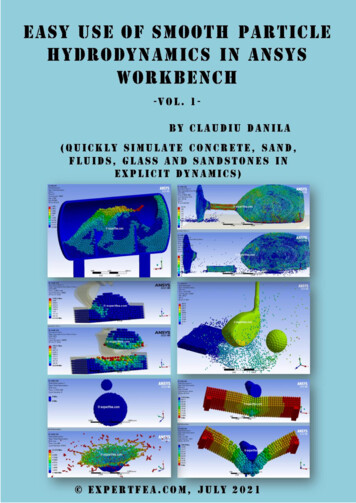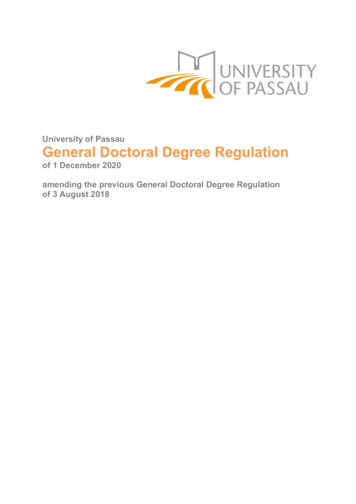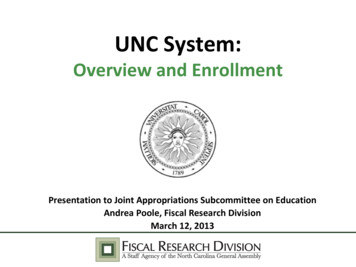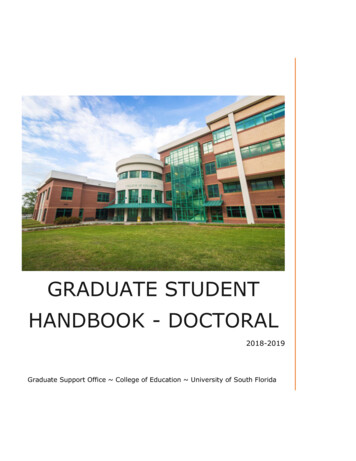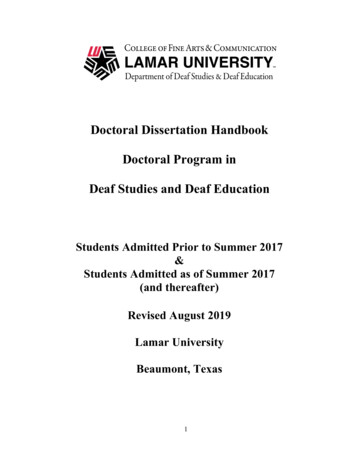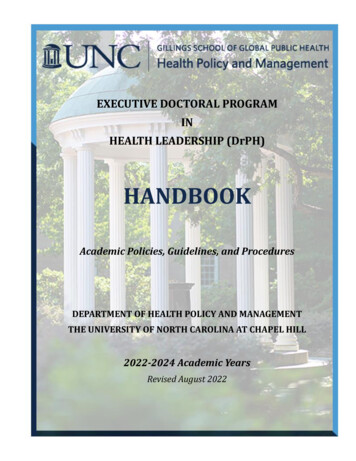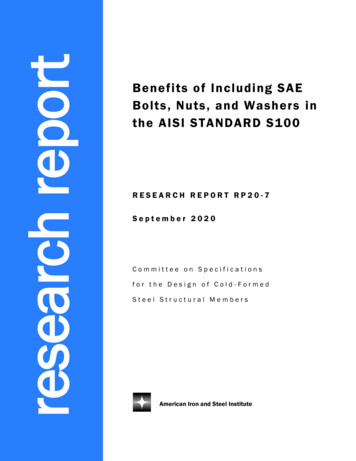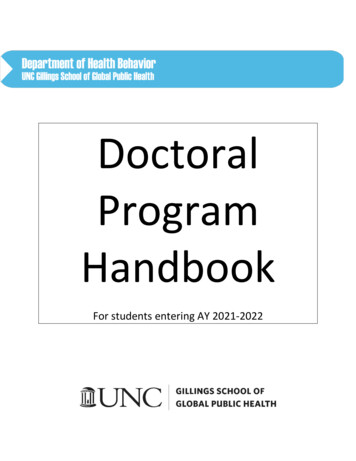
Transcription
DoctoralProgramHandbookFor students entering AY 2021-2022
Table of ContentsOVERVIEW . 4Mission . 4Key personnel . 4A commitment to anti-racism and equity . 5Doctoral Student Advisory Committee . 5Competencies . 5Protection of Human Subjects . 5The Honor Code . 5RESIDENCY AND ENROLLMENT REQUIREMENTS. 5Continuous Enrollment . 6Leave of Absence . 6Parental Leave . 6Leaving the Program before Finishing the Degree . 6ACADEMIC ADVISING AND PROGRESS REPORTING . 6The Faculty Mentor . 6Cohort Advising . 7First Year Progress review and Academic Committee . 7Written Progress Reports . 7Progress Meetings . 8Departmental File . 9STUDENT EMPLOYMENT . 9Employment Issues Related to MSPH-to-PhD Program . 9DOCTORAL TRAINING SEQUENCE . 10Table 1: Doctoral (PhD) Training Sequence and Timetable . 10COURSE REQUIREMENTS . 10Table 2: Minimum PhD Requirements . 11Table 3: At a Glance: PhD Sequence of Requirements (Years 1 and 2) . 12Extension of Timeline for Completing Course Requirements . 12Credit for Previous Coursework . 12Minor Degree . 13Students from Other Departments Pursuing Minors in HB . 13Professional Development . 13Manuscript Preparation. 13PRACTICA . 13Primary Practicum . 14Secondary Practicum . 14Faculty and Student Roles . 15Written Documentation of Practicum Experiences . 15International Travel . 15Waiving Practica . 15THE WRITTEN COMPREHENSIVE EXAMINATION . 15DOCTORAL DISSERTATION . 16The Dissertation Chair . 16Dissertation Credits and Grading . 16The Dissertation Committee . 17Developing the proposal . 17
The Oral Qualifying Examination . 17Admission to Candidacy . 18Dissertation Format . 18Defense Timeline . 20Table 4: Dissertation Defense Timeline . 20Dissertation Defense . 21MSPH TO PHD DEGREE . 22MSPH-to-PhD Training Sequence . 22Table 5: MSPH-to-PhD Training Sequence and Timetable . 22MSPH-to-PhD Course Requirements . 22Table 6: Minimum Course Requirements for the MSPH-to-PhD Degree . 23Table 7: At a Glance: MSPH-to-PhD Sequence of Requirements . 24MSPH Research Practicum and Publishable Paper . 24Table 8: MSPH Research Practicum and Paper Sequence and Timetable . 25Additional Requirements for the MSPH Degree . 26Additional Requirements for the PhD Degree . 26Special Note on Advising for MSPH-to-PhD Students . 26Transferring to the MPH Program . 26APPENDICES . 27Appendix 1: Guidelines for Progress Review Meetings for First-Year PhD Students . 28Appendix 2: Checklist of requirements for the PhD Degree . 29Appendix 3: Practicum Learning Contract Template . 30Appendix 4: Guidelines for Progress Review Meetings for First-Year MSPH-to-PhD Students. 31Appendix 5: Checklist of requirements for the MSPH-to-PhD Degree . 32Appendix 6: MSPH Research Practicum Contract Template . 33Appendix 7: MSPH Research Paper Requirements . 34Appendix 8: Summary of dissertation process . 36
OVERVIEWThe Department of Health Behavior is in the UNC Gillings School of Global Public Health. Thedepartment offers the Doctor of Philosophy (PhD) and the MSPH (Master of Science in Public Health)-toPhD degrees. The Handbook describes the competencies guiding training and degree requirements forboth programs. Additional resources (including archives of guidelines from previous academic years) areavailable on the doctoral program Sakai site. All enrolled doctoral students have access to this site.Two other documents contain important information and regulations: (1) Gillings School of Global PublicHealth Student Resources and (2) The Graduate School Handbook. The Graduate School Handbookdescribes policies and procedures of The Graduate School, including academic requirements andregulations, which apply to all graduate students. Other useful information is available on The GraduateSchool webpage. It is the student’s responsibility to be aware of and comply with all requirements inthese documents.The Handbook is updated annually. When new doctoral policies take effect, some of which may replaceexisting policies, they are communicated to students and posted on the doctoral program Sakai site.MISSIONDoctoral training in Health Behavior prepares graduates for research careers in academic, non-profit,and governmental settings and for leadership roles. Graduates are trained to conduct independentresearch on the context and etiology of health-related behaviors that contribute to domestic and globalpublic health problems and on the development, evaluation, and dissemination of interventions toameliorate those problems.KEY PERSONNELThe doctoral program is administered by the doctoral program director, in coordination with thedepartment’s Academic Coordinator. The doctoral program director is responsible for all issues relatedto enrolled doctoral students. The doctoral program is guided by a doctoral advisory committee (DAC)made up of department faculty members. Committee members are appointed by the chair of thedepartment. The doctoral program director serves as the chair of DAC.A COMMITMENT TO ANTI-RACISM AND EQUITYThe Health Behavior department is committed to promoting anti-racism and equity in our training,research, and practice. We also aim to create an inclusive and supportive environment for students,faculty, and staff. We recognize that such a commitment requires intentional action, critical reflection,and iterative assessment of our individual and collective actions. To advance our processes of anti-racistreflection and action, we have created several structures in the department. The Equity llective/) was established by a group of Health Behaviorstudents in 2017 to create, promote and sustain equity in the Department of Health Behavior. TheHealth Behavior Equity Task Force ) is a group ofHealth Behavior faculty formed in 2020 to promote anti-racism and equity through the development ofan Equity Action and Accountability Plan. All Health Behavior faculty are members of an Equity ActionTeam focused on addressing strategies outlined in the Plan.DOCTORAL STUDENT ADVISORY COMMITTEEThe doctoral student advisory committee (DSAC) serves as a representing body of the doctoral students;nominations to DSAC are made annually. The primary role of DSAC is to serve as a liaison andrepresentative voice of the doctoral student body to the departmental faculty and administration,including representation at faculty meetings. In addition, DSAC coordinates events and purchases withstudent fees pursuant to student professional development needs, social events, and studentrecruitment and orientation events. More information about DSAC can be found on the HB DoctoralProgram Sakai site.In addition to serving on DSAC, doctoral students are strongly encouraged to participate regularly in4
other aspects of department life. This participation could include: attending lectures sponsored by thedepartment and school; attending dissertation defenses; meeting with faculty candidates; serving as astudent representative (if invited) for faculty searches or other ad hoc assignments; and/or serving in aleadership role in one of the many other student organizations in the school and on campus.COMPETENCIES GUIDING DOCTORAL TRAININGDoctoral students are expected to gain and demonstrate competency in theoretical foundations of thefield, research methods, interventions, and in professional development topics. These competenciesrepresent minimum objectives that form the foundation of doctoral training. By the end of the programdoctoral students will be able to:1. Integrate social science and behavioral theories and empirical research to critically assess howhealth behaviors are formed and changed.2. Critique the scientific literature in terms of the study design, methodological approach,interpretation, and presentation of research relevant to the field of health behavior.3. Identify essential and compelling gaps in understanding of determinants and outcomes of healthbehaviors and develop appropriate research questions to address these gaps.4. Select and apply appropriate study designs, operational measures, and analytic methods toevaluate relevant research questions and hypotheses related to health behaviors.5. Apply theories, conceptual paradigms, and evidence to inform the design, implementation,evaluation, adaptation and dissemination of health behavior programs and policies.6. Communicate health behavior research to diverse audiences via presentations and publications.All students have additional learning objectives and develop specialized and in-depth competencies intheir specific areas of interest.PROTECTION OF HUMAN SUBJECTSTraining in ethical issues related to research involving human subjects is required of all students who areengaged in the planning, conduct, or analysis of research at UNC that involves human subjects. In thefirst fall semester, doctoral students must complete a web-based training program, the Collaborative IRBTraining Initiative (CITI), and must be registered in the UNC Ethics Training Database. Information aboutthe CITI on-line course and registration in the database may be found at UNC’s Office of HumanResearch Ethics (OHRE) webpage.All research involving human subjects must be approved by the Institutional Review Board (IRB) for theProtection of Human Subjects. Doctoral students must have IRB approval for the doctoral dissertation.THE HONOR CODEDoctoral students are subject to the regulations of the Honor Code and are expected to review andunderstand the code. The complete code can also be found in The Graduate School Handbook.RESIDENCY AND ENROLLMENT REQUIREMENTSPhD students must register full-time in the department (nine or more credit hours per semester) for thefall and spring semesters during the first two years. MSPH-to-PhD students must register full-time forfall and spring semesters during the first three years.Full-time enrollment exceptions in the second (or third for MSPH-to-PhD students) year may be madeunder special circumstances, subject to approval of the department chair and doctoral program director.See Registration in The Graduate School Handbook for minimum requirements. The department strongly5
recommends that students continue to maintain residency at least until the oral qualifying examinationis passed and the dissertation is underway. See also Residence Credit in The Graduate School Handbookfor the minimum number of semester registration requirements at UNC-Chapel Hill.Continuous EnrollmentDoctoral students are expected to engage year-round with faculty on research and other mentoredactivities. Students are encouraged to stay continuously involved, including over summers, in activitiesto advance their training. Students are expected to discuss their summer plans and registration withtheir mentors.Registration is required during the first or second summer session if students are taking a course(s),completing a practicum, or fulfilling work related to an academic milestone. Academic milestonesinclude completing the doctoral written comprehensive exam, the oral comprehensive exam, and thedissertation defense. PhD students completing the primary (HBEH 842) or secondary (HBEH 843)practicum or MSPH-to-PhD students completing the research practicum (HBEH 744) during the summerare required to register for at least one credit in summer session I or II. Students must be registered forthree credit hours of dissertation (HBEH 994) during the semesters or summer sessions in which thedissertation is proposed (oral exam) and defended.Leave of AbsenceStudents in good academic standing may request a leave of absence for a defined period (up to oneyear), during which no academic progress is made. After consultation and approval from the facultymentor and doctoral program director, students should complete a Request of Leave of Absence form,available on the Graduate School website (https://gradschool.unc.edu/). Students should give thecompleted form to the doctoral program director for completion of the departmental section andsignature; the Academic Coordinator will file the application with the Graduate School.Parental LeaveUNC’s Graduate Student Parental Leave Policy is designed to assist a full-time graduate studentimmediately following the birth or adoption of a child, if the student is the primary child-care provider.The form to request parental leave can be found here.Leaving the Program before Finishing the DegreeOccasionally, doctoral students may find that the PhD Program in Health Behavior is not a good fit withtheir interests and long-term career goals. In those cases, students are encouraged to speak with theirfaculty mentor and the doctoral program director. The faculty mentor and doctoral program directormay be able to point the student towards courses and resources that better support the student or helpwith applications to other programs or career opportunities.In some cases, students leaving the program before completing the PhD may be eligible to earn aMaster of Science in Public Health (MSPH). To be eligible, students need to complete the followingrequirements: all doctoral required core courses; a total of 40 credit hours with at least P grades; theprimary practicum (HBEH 842); and a publishable manuscript, as assessed by a three-member facultycommittee. Students who wish to be considered for this option should consult with their faculty mentorand the doctoral program director. Students who matriculated into the MSPH-to-PhD track shouldconsult the guidelines to determine requirements for earning the MSPH as a terminal degree.ACADEMIC ADVISING AND PROGRESS REPORTINGThe Faculty MentorStudents are assigned a faculty mentor upon entering the doctoral program. The department considersstudent preference, match of faculty and student research interests, and faculty preference andavailability in assigning mentors. The faculty mentor is responsible for approving activities that satisfycourse requirements.If appropriate, either the student or mentor may decide later that another faculty member is moresuitable as faculty mentor for that student. These types of changes occur routinely, pending theapproval of the doctoral program director, with the only potential barriers being the availability of a6
departmental faculty member qualified and willing to serve as mentor. The faculty mentor will typicallyserve as the chair of the student’s dissertation committee but that is not automatic (see DoctoralDissertation).Doctoral students are expected to work independently to make appropriate progress in the program,even as they also work closely with the faculty mentor and other faculty. The mentor helps the studentidentify courses and practica and assists with any problems affecting the student’s relationships withfaculty, colleagues, or the department at large. Students are responsible for seeking meetings as neededwith their faculty mentors. As a rule, students should proactively schedule at least one face-to-facemeeting with their mentor or dissertation chair each semester, no matter where they are in the doctoralprogram. We also encourage students to get to know and work with a range of faculty during their first2 years of training.Cohort AdvisingThe doctoral program director meets with doctoral students by cohort in the first three years for PhDstudents and during the first year for MSPH-to-PhD students.First Year Progress Review and Academic CommitteeAt the end of their first year in the program, the PhD student and faculty mentor form an academiccommittee to assist both the student and faculty mentor in formally reviewing the student’s progress inthe doctoral program.a The academic committee consists of the student’s faculty mentor plus two otherfaculty members approved by the faculty mentor. See Appendix 1 for guidance on first year progressreview meetings.At least one week before the formal progress review, the student sends the committee members asummary report including:(1) Educational and professional objectives,(2) Completed and proposed coursework, with grades for completed coursework (use the Checklistof Requirements for the PhD degree in Appendix 2)(3) Practicum descriptions and learning contracts (if available),(4) A description of other involvements and responsibilities (e.g., research assistantships,fellowships),(5) A list of questions for the committee, and(6) Current curriculum vitae.The student’s faculty mentor opens and closes the meeting, with the student taking the lead inreporting their progress over the first year. Within a week after the meeting, the student prepares abrief summary statement of the committee’s evaluation and recommendations and submits itelectronically to the faculty mentor, each committee member, the doctoral program director, and theAcademic Coordinator for inclusion in the student’s permanent file.If the faculty mentor deems it appropriate, the academic committee may be activated for additionalmeetings after the first-year progress review.Written Progress ReportsAt the end of the fifth semesterb and every semester thereafter until graduation, students provide awritten progress report via email to the faculty mentor (or dissertation chair), the doctoral programdirector, and the Academic Coordinator for inclusion in the student’s permanent file. The report shouldbe submitted no later than the beginning of exam week for the fall and spring semesters and should beno longer than two pages. Students should include an updated Checklist with each report (Appendix 2)indicating any coursework or milestones completed since the last report.For students who have not yet passed the oral qualifying exam (i.e., presented the dissertationproposal), the report should identify:(1) the dissertation topic or progress toward identifying a topic;abThis meeting takes place in second year for students enrolled in the MSPH-to-PhD Program.Seventh semester for students enrolled in the MSPH-to-PhD Program.7
(2) the dissertation research questions/aims or progress toward formulating them.(3) the likely chair or possible candidates and faculty with whom the student has met to discussdissertation ideas;(4) specific, achievable goals over the next semester to move closer to being ready for the oralqualifying exam;(5) barriers to progress; and(6) how the department can help the student achieve the goal of progressing to, and ultimatelypassing, the oral qualifying exam.For students who have passed their oral qualifying exam, the report should include the followinginformation:(1) date of the oral qualifying exam;(2) names and department affiliations of dissertation committee members;(3) subject area or working title of the dissertation;(4) report of progress since the last end-of-semester progress report including what stage(s) of thedissertation process the student is in (e.g., data collection, analysis, writing up results);(5) a self-assessment of the degree to which the student achieved each of the goals included in theprevious progress report;(6) specific, achievable goals for what progress will be completed over the next semester;(7) barriers to progress;(8) expected date (month and year) of the dissertation defense; and(9) any problems, special circumstances, successes since the last report.Progress reports provide a basis for the written dissertation plan students are expected to prepare eachsemester in which they are enrolled for dissertation credits (see Doctoral Dissertation). Dissertationplans and progress reports should be submitted after a “check in” with the student’s faculty mentor ordissertation chair.As noted earlier, doctoral students should schedule at least one meeting with their faculty mentors eachsemester. Faculty mentors are also encouraged to call an interim meeting if they determine that anadvanced doctoral student would benefit.Progress MeetingsBeginning at the eighth semesterc, students who have not successfully passed the oral qualifying exammust schedule an annual progress review meeting with a committee made up of at least threedepartmental faculty members including: (1) the doctoral program director, who chairs the committee;(2) the faculty mentor (or dissertation chair if already selected); and (3) one or two other departmentalfaculty members, approved by the doctoral program director. While welcomed as members ofdissertation committees, faculty members from outside departments are not appropriate as membersof the progress meeting committee.At the beginning of the semester, students who are due for a progress meeting will be notified by thedoctoral program director and asked to nominate faculty members other than the faculty mentor toserve on the committee. The doctoral program director can approve the nominations or name otherfaculty members to the committee. Once committee membership is established, the student isresponsible for contacting committee members to schedule the meeting and for reserving a meetinglocation. Students should submit the written progress report to all committee members one week priorto the meeting.Students who require a progress meeting but who have formally scheduled the oral qualifying exam mayrequest a waiver of the progress meeting by emailing the doctoral program director. The progresscommittee provides guidance to the faculty mentor/dissertation committee chair on whether thestudent is making adequate progress toward completion of the doctoral degree. If warranted, theprogress committee may recommend more frequent meetings with the student than annually. Also, ifthere are committee concerns about student progress, the committee may establish writtencTenth semester for MSPH-to-PhD students.8
expectations and a timetable for benchmarks that the student must meet for successful completion ofthe degree. The faculty mentor/dissertation chair will use these expectations in grading studentprogress on the dissertation (see Doctoral Dissertation).Departmental FileThe department’s Academic Coordinator maintains a permanent file for each student. Copies ofprogress meeting materials, progress reports, practicum learning contracts, requirement checklists, andall other paperwork related to the student’s academic career are stored in the file. It is the student’sresponsibility to provide copies of these documents to the Academic Coordinator.STUDENT EMPLOYMENTStudents are encouraged to seek and complete service work through research, teaching, and graduateassistantships as an integral part of training. To support and enable students’ academic progress, thedepartment recommends that throughout their training, students’ service work or other employmentnot exceed 20 hours per week on average. This maximum is cumulative across all positions during fall orspring semesters. During required coursework (i.e., fall and spring semesters of years 1 and 2 for PhDstudents; years 1, 2, and 3 for MSPH-to-PhD students), 20 hours is the maximum allowable hours ofemployment per week that can be paid through sources that flow through UNC-Chapel Hill’s accounting.Note that a non-service stipend paid through the university by a fellowship is usually considered to beequivalent to employment at 20 hours per week. If allowable by the fellowship, students may completea full or part-time teaching assistantship and be compensated for it; research assistantships typically ar
The Department of Health Behavior is in the UNC Gillings School of Global Public Health. The department offers the Doctor of Philosophy (PhD) and the MSPH (Master of Science in Public Health)-to-PhD degrees. The Handbook describes the competencies guiding training and degree requirements for both programs. Additional resources (including .


